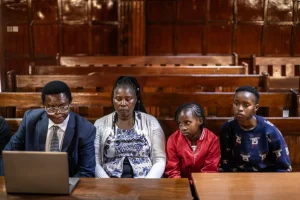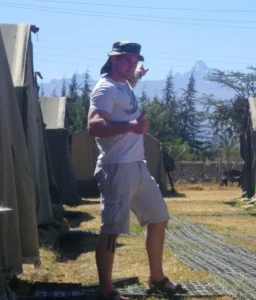Investigations
Finally! Ex-British Soldier Accused of Killing Agnes Wanjiru Identified As Robert James Purkiss
Purkiss served in the British Army from 2006 to 2016, working as a combat medic and infantryman.

Thirteen years after young mother’s body was found in septic tank, Kenya issues arrest warrant for former Duke of Lancaster’s Regiment medic
After more than a decade of delays, cover-ups and bureaucratic failures, the British ex-soldier accused of murdering 21-year-old Kenyan mother Agnes Wanjiru can finally be named: Robert James Purkiss.
The 38-year-old father of two from Greater Manchester, who now works as a computer support technician near Salisbury, faces extradition to Kenya following a Kenyan High Court arrest warrant issued last week. Justice Alexander Muasya Muteti ruled there was “probable cause to order the arrest of the accused and his surrender before this court for trial.”
The case represents one of the most damning indictments of British military culture in recent memory, revealing a systematic cover-up that allowed an alleged killer to escape justice while destroying the life of the whistleblower who tried to expose the truth.
The Night That Changed Everything
On March 31, 2012, Agnes Wanjiru was celebrating recent achievements.
The young hairdresser had just qualified in her profession and harbored dreams of opening her own salon to support her five-month-old daughter, Stacey.
Despite living in poverty in a makeshift dwelling outside Nanyuki, she remained optimistic about the future.
That evening, Wanjiru joined friends at the Lions Court Hotel, a popular venue with British soldiers from the Duke of Lancaster’s Regiment who were enjoying rest and relaxation after weeks of battlefield training exercises.
The soldiers were due to return to the UK the following day.
Witnesses saw Wanjiru leaving the bar area with a British soldier, walking toward the hotel rooms. She was never seen alive again.
Two months later, on June 5, 2012, hotel gardener John Gichuki Ndirangu discovered her decomposed body in a septic tank on the hotel grounds exactly where a British soldier had claimed to have seen it hours after the murder allegedly occurred.
The Confession That Was Buried
The most shocking aspect of this case is not just the alleged murder, but the systematic suppression of evidence that followed.
According to witness testimony gathered over years of investigation, the crime was reported to military authorities within hours of occurring yet nothing was done.
Multiple soldiers have now come forward to describe how Purkiss (previously referred to as “Soldier X” in investigations) allegedly confessed to the killing. The key witness, known as “Soldier Y,” has provided a detailed account of events that night.
“I were in the pub and he come in crying, saying, ‘Help me, help me,’” Soldier Y told investigators. “I said, ‘Why, what do you mean?’ ‘I’ve killed her,’ he said. ‘Show me.’”
According to this account, Purkiss led Soldier Y and two others to the septic tank where Wanjiru’s body lay. “She was in the tank when I seen her,” Soldier Y recalled. “He took me to the tank and lifted it up and I looked in and I just remember seeing her in there and my heart sank.”
The Military’s Response: Silence and Threats
What happened next reveals the depths of institutional failure within the British Army.
When Soldier Y reported the confession to military police upon returning to base, he was dismissed as unreliable. Officers allegedly told soldiers to “keep quiet” about the murder allegations or face being detained in Kenya.
The regiment flew back to the UK the following day, just as Wanjiru’s friends began searching for her missing companion.
A section commander from the regiment has confirmed that rumors about the killing spread rapidly through the ranks.
“The rumour was flying around. ‘Did you hear the rumour about [Soldier X] killing a brass [prostitute]? Apparently he killed a brass and threw her in a septic tank,’” the commander recalled.
Disturbingly, soldiers describe how the murder became “a running joke” at Weeton Barracks in Lancashire, with one officer allegedly joking with Purkiss: “No strangling anyone,” as he left for a night out.
The Whistleblower’s Destruction
The treatment of Soldier Y represents perhaps the most damning aspect of this entire affair.
A decorated veteran with multiple tours in Afghanistan, he faced ostracization, threats, and professional ruin for attempting to expose the truth.
After being labeled a “snitch” by fellow soldiers, Soldier Y’s life spiraled into chaos.
He was discharged from the army, lost his home and family, and turned to drugs to cope with the psychological trauma.
The man who had served his country with distinction ended up with a criminal record and is currently serving a prison sentence for shoplifting.
“He always blames himself. He never thought he did enough,” his mother said. “My son did. He is a hero. But look where heroes end up. On the streets.”
Institutional Failure at Every Level
When Wanjiru’s body was discovered in June 2012, Kenyan police immediately contacted British military authorities.
The Royal Military Police provided basic information about nine soldiers whose names appeared on hotel registers but failed to mention that the murder had been reported by their own personnel within hours of occurring.
Crucially, neither Purkiss nor Soldier Y were among the nine names initially provided, despite both being present at the hotel that night.
This omission appears deliberate rather than accidental.
Military correspondence shows the RMP offered continued cooperation with Kenyan authorities, yet they withheld the most crucial evidence—the confession and witness testimony from their own soldiers.
The Long Road to Justice
The case remained dormant until 2018, when an inquest finally opened in Kenya.
Judge Njeri Thuku was scathing in her assessment, ruling that British soldiers held the key to Wanjiru’s death. Her findings prompted a new criminal investigation by Kenya’s Directorate of Criminal Investigations in 2019.

Mbiyu Kamau, representing the family, follows a 2023 court hearing remotely with Rose Wanyua, Stacy Wanjiru and Esther Njoki
LUIS TATO/AFP/GETTY IMAGES
The Sunday Times investigation, which began in 2021, proved instrumental in bringing this case back to public attention.
Through persistent journalism, the newspaper uncovered the military documents and witness testimonies that revealed the extent of the cover-up.
The investigation led to significant policy changes, including the Ministry of Defence introducing zero tolerance for sexual exploitation and abuse in the armed forces, and banning soldiers from paying for sex overseas for the first time in British Army history.
Political Intervention and New Hope
The case gained renewed momentum when John Healey became Defence Secretary in the current Labour government.
Unlike his predecessors, Healey met with Wanjiru’s family at the British High Commission in Nairobi earlier this year, signaling the UK’s commitment to pursuing justice.
“We are happy that finally, after a long wait and frustration, the government has begun to act, although it has taken a long time,” said Esther Njoki, the family spokeswoman. “We have a ray of hope that now the family will be served justice.”
The Accused: Robert James Purkiss
Purkiss served in the British Army from 2006 to 2016, working as a combat medic and infantryman.
He completed multiple tours in Afghanistan and was stationed at various bases including Catterick garrison in North Yorkshire and Tidworth barracks in Wiltshire before joining the Duke of Lancaster’s Regiment at Weeton barracks in Blackpool.
After leaving the military, he settled near Salisbury where he now works as a home computer support technician.
The father of two has maintained a low profile, but former soldiers have recently been openly naming him on social media as Wanjiru’s alleged killer.
Legal Challenges Ahead
The Kenyan government must now formally request Purkiss’s extradition through the Home Office, which will trigger a hearing at Westminster magistrates’ court. Legal experts suggest the evidence, particularly Soldier Y’s witness testimony, could be compelling in any future trial.
“A witness has been shown the body by the killer,” said criminal lawyer Joseph Kotrie-Monson. “That is compelling evidence for any jury.”
However, the extradition process could prove lengthy and complex, requiring careful navigation of international legal frameworks.
A Legacy of Betrayal
The Agnes Wanjiru case has exposed fundamental flaws in military justice and accountability.
It demonstrates how institutional loyalty can override moral duty, how whistleblowers face destruction for telling the truth, and how bureaucratic inertia can deny justice to the most vulnerable.
For Agnes Wanjiru’s daughter, Stacey, now 13 years old, the identification of her mother’s alleged killer offers hope for answers she has waited her entire life to receive.
But it cannot undo the years of pain caused by a system that chose silence over justice.
As Dr. Iain Overton of Action on Armed Violence observed: “This is not just a failure of individual soldiers, but a systemic collapse in accountability. The British military’s refusal to address this heinous crime for over a decade reflects an institution that places its own reputation above the pursuit of justice.”
What Happens Next
Kenya’s extradition request will now be processed by UK authorities. If successful, Purkiss will face trial in Nairobi for the murder of Agnes Wanjiru—13 years after her death and over a decade since the British Army first learned of the allegations against him.
The case serves as a stark reminder that justice delayed is justice denied, and that the most powerful institutions are not above the law.
For Agnes Wanjiru’s family, the long wait for answers may finally be coming to an end.
A UK government spokesperson said: “Our thoughts remain with the family of Agnes Wanjiru and we remain absolutely committed to helping them secure justice. We understand that the Kenyan director of public prosecutions has determined that a British national should face trial in relation to the murder of Ms Wanjiru in 2012.”
The story of Agnes Wanjiru—young mother, aspiring entrepreneur, victim of alleged murder and institutional betrayal—will not be forgotten.
Her case has already changed British military policy and exposed the dark side of military culture.
Now, finally, it may also deliver the justice her family has sought for so long.
Kenya Insights allows guest blogging, if you want to be published on Kenya’s most authoritative and accurate blog, have an expose, news TIPS, story angles, human interest stories, drop us an email on [email protected] or via Telegram
-

 Business4 days ago
Business4 days agobetPawa Empire Crumbles: Mr Eazi’s Betting Gambit Unravels Amid Partner’s Shadowy Deals
-

 Investigations1 week ago
Investigations1 week agoKERRA Homa Bay Region Manager Calvince Thomas Accused of Swindling Businessman Ksh 2 Million in Phantom Tender Deal
-

 Business5 days ago
Business5 days agoKRA Boss Humphrey Watanga In Big Trouble In Sh5.5 Billion Rice Import Scandal
-

 Business1 week ago
Business1 week agoTreasury’s Sh40 Billion Safaricom Gamble Could Cost Kenya Trillions, Auditor Warns
-

 News3 days ago
News3 days agoAuditor-General Exposes Brazen Corruption at Kenya Roads Board, Sends Management into Panic
-

 Business3 days ago
Business3 days agoState Set to Demolish Pastor Ng’ang’a’s Church in Sh28 Billion Railway City Push
-

 News1 day ago
News1 day agoDCI Probes Meridian Equator Hospital After Botched Procedure That Killed a Lawyer
-

 Business5 days ago
Business5 days agoHow Air Ticketing Firm Was Targeted and Hacked in Sh22 Million Scam



































